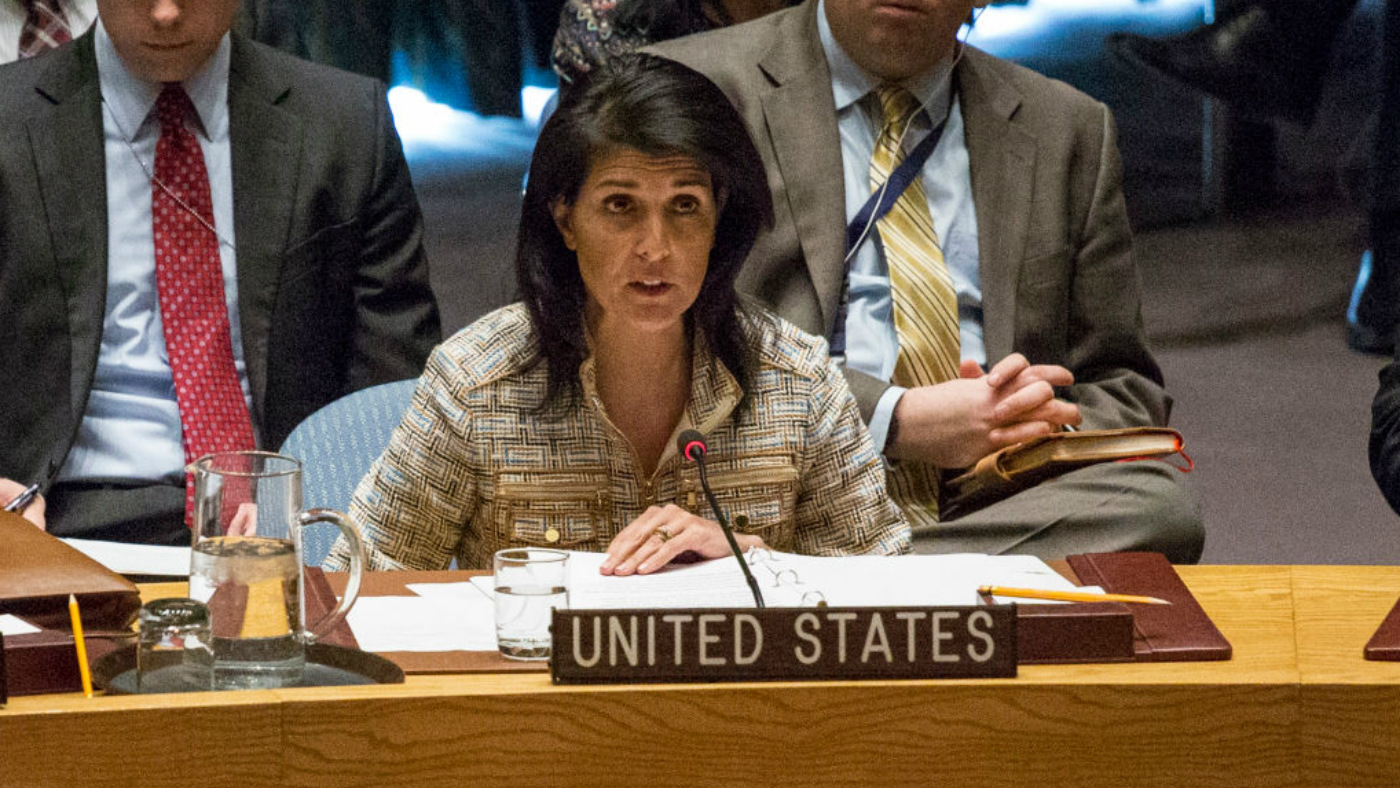US and Russia spar over vetoed Syria sanctions
Anger as Moscow blocks UN sanctions over regime's use of chemical weapons

A free daily email with the biggest news stories of the day – and the best features from TheWeek.com
You are now subscribed
Your newsletter sign-up was successful
What does ambassador's murder mean for Turkey and Russia?
20 December
An off-duty police officer shot dead Russia's ambassador to Turkey in an Ankara art gallery last night in a violent protest against Moscow's involvement in the Syrian conflict.
A video of the attack shows Mevlut Mert Aydintas, 22, standing calmly behind diplomat Andrei Karlov, 62, as he delivered a speech at the opening of a photographic exhibition.
The Week
Escape your echo chamber. Get the facts behind the news, plus analysis from multiple perspectives.

Sign up for The Week's Free Newsletters
From our morning news briefing to a weekly Good News Newsletter, get the best of The Week delivered directly to your inbox.
From our morning news briefing to a weekly Good News Newsletter, get the best of The Week delivered directly to your inbox.
Several minutes into the address, Aydintas pulled out a gun, shouted: "Allahu Akbar" and fired at least eight shots.
He then shouted: "Don't forget Aleppo. Don't forget Syria. Unless our towns are secure, you won't enjoy security. Only death can take me from here. Everyone who is involved in this suffering will pay a price."
Aydintas was subsequently killed in a 15-minute police shoot-out. Three others were also wounded.
So what does this mean for Russian-Turkish relations?
A free daily email with the biggest news stories of the day – and the best features from TheWeek.com
Russian President Vladimir Putin said the shooting was "clearly a provocation aimed at undermining the improvement and normalisation of Russian-Turkish relations, as well as undermining the peace process in Syria". The "only response" to the attack was to step up the fight against terrorism, he said.
RT, the news organisation with close links to the Kremlin, says Putin has spoken with Turkish President Recep Tayyip Erdogan and that the two countries will cooperate in the investigation.
The killing might seem "minor" by comparison to the civil war raging in Syria and Iraq, the refugee crisis and massacres in Europe, says The Times, "but it could have serious consequences: history proves that assassinations can easily trigger wars".
Questions will be asked as to how the killer's apparent radicalisation went unnoticed, it adds, and in Turkey and the broader Middle East, "all such questions lead to conspiracy theories".
The paper also notes it is a year since Turkey shot down a Russian jet. "With the two backing opposite sides in the great clash between Sunni and Shia [Muslims], this wound will take time to heal," it says.
The Spectator says the friendship between the two countries over Syria has "been on ice so thin, both sides have suffered frostbite".
After reaching an agreement within the last week to allow the evacuation of Aleppo, "the question now is whether the fulfilment of this deal, and others potentially in the works in Syria, could now be unpicked by the actions of one man," it adds.
-
 Crisis in Cuba: a ‘golden opportunity’ for Washington?
Crisis in Cuba: a ‘golden opportunity’ for Washington?Talking Point The Trump administration is applying the pressure, and with Latin America swinging to the right, Havana is becoming more ‘politically isolated’
-
 5 thoroughly redacted cartoons about Pam Bondi protecting predators
5 thoroughly redacted cartoons about Pam Bondi protecting predatorsCartoons Artists take on the real victim, types of protection, and more
-
 Palestine Action and the trouble with defining terrorism
Palestine Action and the trouble with defining terrorismIn the Spotlight The issues with proscribing the group ‘became apparent as soon as the police began putting it into practice’
-
 A student’s death energizes the French far right
A student’s death energizes the French far rightIN THE SPOTLIGHT Reactions to the violent killing of an ultraconservative activist offer a glimpse at the culture wars roiling France ahead of next year’s elections
-
 Greenland’s capital becomes ground zero for the country’s diplomatic straits
Greenland’s capital becomes ground zero for the country’s diplomatic straitsIN THE SPOTLIGHT A flurry of new consular activity in Nuuk shows how important Greenland has become to Europeans’ anxiety about American imperialism
-
 Epstein files topple law CEO, roil UK government
Epstein files topple law CEO, roil UK governmentSpeed Read Peter Mandelson, Britain’s former ambassador to the US, is caught up in the scandal
-
 Iran and US prepare to meet after skirmishes
Iran and US prepare to meet after skirmishesSpeed Read The incident comes amid heightened tensions in the Middle East
-
 Syria’s Kurds: abandoned by their US ally
Syria’s Kurds: abandoned by their US allyTalking Point Ahmed al-Sharaa’s lightning offensive against Syrian Kurdistan belies his promise to respect the country’s ethnic minorities
-
 Israel retrieves final hostage’s body from Gaza
Israel retrieves final hostage’s body from GazaSpeed Read The 24-year-old police officer was killed during the initial Hamas attack
-
 China’s Xi targets top general in growing purge
China’s Xi targets top general in growing purgeSpeed Read Zhang Youxia is being investigated over ‘grave violations’ of the law
-
 Syria’s Islamic State problem
Syria’s Islamic State problemIn The Spotlight Fragile security in prison camps leads to escape of IS fighters